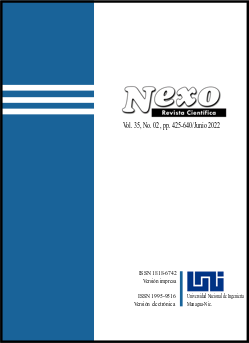Carbon bonds as a proposal for environmental conservation for the micro-watershed Ejido la Laguna OM in Quintana Roo, Mexico
DOI:
https://doi.org/10.5377/nexo.v35i02.14623Keywords:
Climate Change, Soil and Water Conservation, Hydrological Basins, Mayan TrainAbstract
Carbon bonds are a management tool that is being implemented globally to reduce CO2 emissions into the environment, through forest, soil and water conservation protocols. It forms a main part of the commitments made in the Kyoto Protocol to reduce global warming. For its part, the state of Quintana Roo is a pioneer in the incursion of carbon bonds at the micro-basin level, and where sustainable tourism is consolidated as a preponderant activity catapulted by the spill over effect of the Mayan Train Megaproject, however; the lack or inadequate environmental planning could produce deleterious effects. In this sense, they have been allocated by assembly agreement in 2019 (35 thousand Ha) of tropical forest as ANP. With the technical support of specialists (UTCalakmul), the total biomass, carbon storage and fixation in PF and SAF were estimated as a mitigation indicator according to IPCC. Total height and DBH of trees with DBH≥10 cm and D30 in the case of timber trees were measured. BA was estimated using allometric methods and with biomass expansion factors. The average fixation rate was 5.9 t C/ha/year and the FPs stored up to 70 t C/ha. The participation of the ejido in caring for the forest, soil and water in collaboration with NGOs led to the issuance of the bonds as of August 15, 2021. The results obtained demonstrate the importance of these mechanisms for the promotion of soil, water and forest conservation in Quintana. Roo. And that the integral participation in community projects by academics, NGOs and community members is viable and feasible.
Downloads
2781
Downloads
Published
How to Cite
Issue
Section
License
Copyright (c) 2022 Universidad Nacional de Ingeniería

This work is licensed under a Creative Commons Attribution 4.0 International License.
The authors who publish in Nexo Scientific Journal agree to the following terms:
- Authors retain the copyright and grant the journal the right of the first publication under the license Creative Commons Attribution License, which allows others to share the work with a recognition of the authorship of the work and the initial publication in Nexo Scientific Journal.
- Authors may separately establish additional agreements for the non-exclusive distribution of the version of the work published in the journal (for example, in an institutional repository or a book), with the recognition of the initial publication in Nexo Scientific Journal.
- Authors are allowed and encouraged to disseminate their works electronically (for example, in institutional repositories or in their own website) before and during the submission process, as it can lead to productive exchanges, as well as earlier and greater citation of published works.










